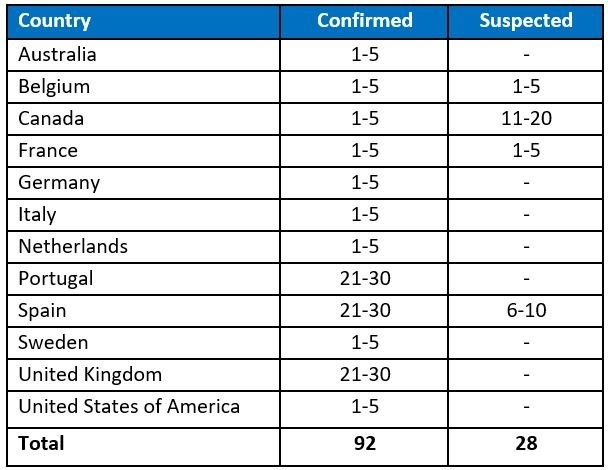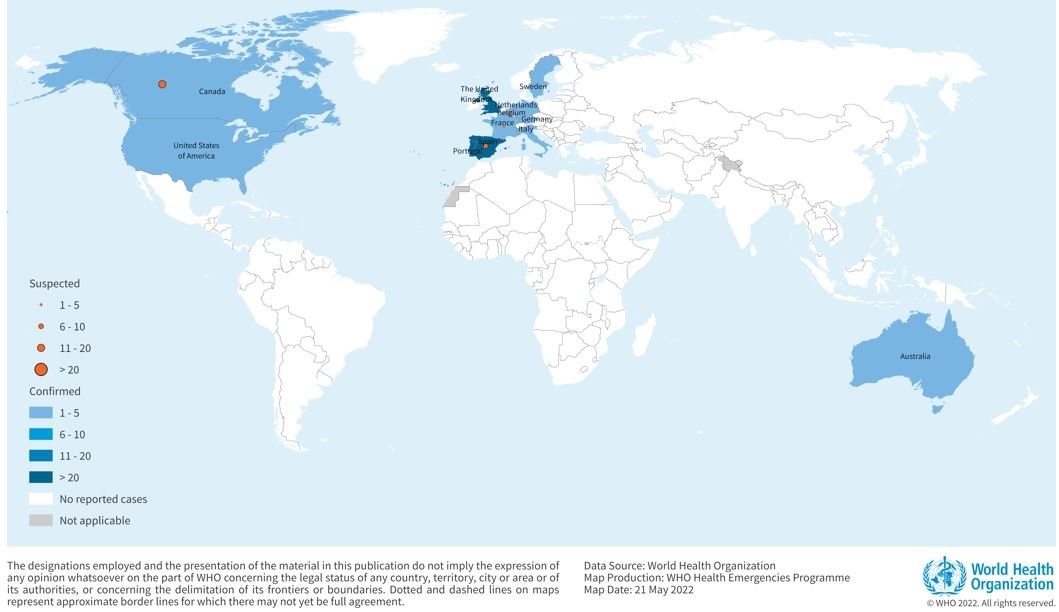Epidemiology: Monkeypox is a rare disease that is caused by an infection with monkeypox virus. Monkeypox was first discovered in 1958 when outbreaks of a pox-like disease occurred in monkeys kept for research. The first human case was reported in 1970 in the Democratic Republic of the Congo (DRC), and since then the infection has been reported in many central and western African countries. Since 1970, human cases of monkeypox have been reported in 11 African countries-Benin, Cameroon, the Central African Republic, the DRC, Gabon, Cote d’Ivoire, Liberia, Nigeria, the Republic of the Congo, Sierra Leone, and South Sudan. Most of the cases are reported from the DRC and Nigeria and the virus has been termed to be endemic in Nigeria and is considered “rare and unusual”. Since 2017, Nigeria has experienced a large outbreak, with over 500 suspected cases and over 200 confirmed cases.
In 2003, the monkeypox outbreak was reported for the first-time outside Africa in the United States of America caused by the infected pet prairie dogs which have been kept along with Gambian pouched rats and dormice that are imported from Ghana. This outbreak has caused 70 cases of monkeypox in the U.S. Monkeypox has also been reported in travelers from Nigeria to Israel in September 2018, to Singapore in May 2019, to the United Kingdom in September 2018, December 2019, May 2021 and May 2022, and to the United States of America in July and November 2021.
Since 13th May, 2022, the cases of monkeypox virus have been confirmed in 12 non-endemic countries across WHO regions. As of 21st May, 2022, there are about 92 confirmed and 28 suspected cases, however no associated deaths have been reported till date. So far there are no cases of this virus reported in India.

Table 1: Cases of monkeypox in non-endemic countries reported between 13 to 21st May 2022 (Source: WHO).

Figure 1: Geographical distribution of confirmed and suspected cases of monkeypox in non-endemic countries between 13 to 21st May 2022 (Source: WHO).
Transmission: WHO has stated that the cases are often found “close to tropical rain forests where there are animals that carry the virus”. Evidence of monkeypox virus infection has been found in animals including squirrels, Gambian poached rats, dormice, and different species of monkeys. The transmission of monkeypox may occur when a person comes into close contact with an infected animal, human, or materials contaminated with the virus. Person-to-person spread is uncommon, but may occur through: contact with clothing, bedding and towels used by an infected person, direct contact with monkeypox skin lesions or scabs, coughing or sneezing of an individual with a monkeypox rash.
Symptoms of monkeypox: The symptoms usually appear after 5 to 21 days of infection. The initial symptoms of monkeypox includes: fever, headache, muscle aches, backache, swollen glands, shivering (chills) and exhaustion. A rash usually appears 1 to 5 days after the initial symptoms on the face, then spreads to other parts of the body. The symptoms usually clear up in 2 to 4 weeks.
Treatment: The illness of monkeypox is usually mild and most of the infected people will recover within a few weeks without treatment. MVA-BN vaccine and specific treatment (tecovirimat) were approved in 2019 and 2022 respectively to control the outbreaks of monkeypox. Vaccination against smallpox can be effective in preventing monkeypox.
Public health response:
· Public health investigations are ongoing in non-endemic countries with identified cases, including case finding, contact tracing, laboratory investigation, clinical management and isolation.
· Genomic sequencing was used to determine the monkeypox virus clade(s) in this outbreak.
· Available vaccination for monkeypox is being provided to manage close contacts like health workers.
Advices:
· Any patient with suspected monkeypox should be investigated and if confirmed should be isolated till cured.